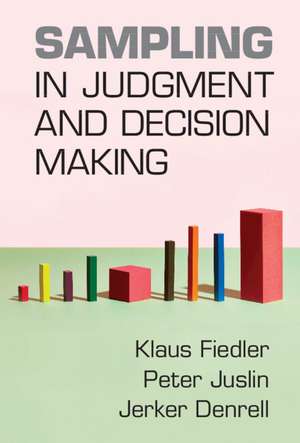Sampling in Judgment and Decision Making
Editat de Klaus Fiedler, Peter Juslin, Jerker Denrellen Limba Engleză Paperback – 14 iun 2023
| Toate formatele și edițiile | Preț | Express |
|---|---|---|
| Paperback (1) | 314.57 lei 3-5 săpt. | +34.20 lei 7-13 zile |
| Cambridge University Press – 14 iun 2023 | 314.57 lei 3-5 săpt. | +34.20 lei 7-13 zile |
| Hardback (1) | 874.50 lei 6-8 săpt. | |
| Cambridge University Press – 14 iun 2023 | 874.50 lei 6-8 săpt. |
Preț: 314.57 lei
Nou
Puncte Express: 472
Preț estimativ în valută:
60.20€ • 63.30$ • 49.74£
60.20€ • 63.30$ • 49.74£
Carte disponibilă
Livrare economică 26 martie-09 aprilie
Livrare express 12-18 martie pentru 44.19 lei
Preluare comenzi: 021 569.72.76
Specificații
ISBN-13: 9781009009867
ISBN-10: 1009009869
Pagini: 520
Dimensiuni: 151 x 228 x 29 mm
Greutate: 0.75 kg
Editura: Cambridge University Press
Colecția Cambridge University Press
Locul publicării:New York, United States
ISBN-10: 1009009869
Pagini: 520
Dimensiuni: 151 x 228 x 29 mm
Greutate: 0.75 kg
Editura: Cambridge University Press
Colecția Cambridge University Press
Locul publicării:New York, United States
Cuprins
1. The theoretical beauty and fertility of sampling approaches: a historical and meta-theoretical review Klaus Fiedler, Peter Juslin and Jerker Denrell; 2. Homo ordinalus and sampling models: the past, present, and future decision by sampling Gordon D. A. Brown and Lukasz Walasek; 3. In decisions from experience what you see is up to your sampling of the world Timothy J. Pleskac and Ralph Hertwig; 4. The hot stove effect Jerker Denrell and Gaël Le Mens; 5. The J/DM separation paradox and the reliance on small samples hypothesis Ido Erev and Ori Plonsky; 6. Sampling as preparedness in evaluative learning Mandy Hütter and Zachary Adolph Niese; 7. The dog that didn't bark: Bayesian approaches to reasoning Brett K. Hayes, Saoirse Connor Desai, Keith Ransom and Charles Kemp; 8. Unpacking intuitive and analytica memory sampling in multiple-cue judgment August Collsiöö, Joakim Sundh and Peter Juslin; 9. Biased preferences through exploitation Chris Harris and Ruud Custers; 10. Evaluative consequences of sampling distinct information Hans Alves, Alex Koch, and Christian Unkelbach; 11. Information sampling in contingency learning: sampling strategies and their consequences for (pseudo-)contingency Franziska M. Bott and Thorsten Meiser; 12. The collective hot stove effect Gaël Le Mens, Balázs Kovác, Judith Avrahami, and Yaakov Kareev; 13. Sequential decisions from sampling: inductive generation of stopping decisions using instance-based learning theory Cleotilde Gonzales and Palvi Aggarwal; 14. Thurstonian uncertainty in self-determined judgment and decision making Johannes Prager, Klaus Fiedler, and Linda McCaughey; 15. The information cost-benefit trade-off as a sampling problem in information search Linda McCaughey, Johannes Prager, and Klaus Fiedler; 16. Heuristic social sampling Thorsten Pachur and Christin Schulze; 17. Social sampling for judgments and predictions of societal trends Henrik Olsson, Mirta Galesic and Wändi Bruine de Bruin; 18. Group-motivated sampling: from skewed experiences to biased evaluations Yrian Derreumaux, Robin Bergh, Marcus Lindskog and Brent Hughes; 19. Opinion homogenization and polarization: three sampling models Elizaveta Konovalova and Gaël Le Mens; 20. An introduction to psychologically plausible sampling schemes for approximating Bayesian inference Jian-Qiao Zhu, Nick Chater, Pablo León-Villagrá, Jake Spicer, Joakim Sundh and Adam Sanborn; 21. Approximating Bayesian inference through internal sampling Joakim Sundh, Adam Sanborn, Jian-Qiao Zhu, Jake Spicer, Pablo León-Villagrá and Nick Chater; 22. Sampling data, beliefs, and actions Erik Brockbank, Cameron Holdaway, Daniel Acosta-Kane, and Edward Vul.
Recenzii
'Inferences depend heavily on what information is sampled. With chapters by leading sampling researchers, this book provides a fascinating overview of the innovative work done on this topic over recent decades. Sample these chapters to gain insights into how our minds work.' Robin Hogarth, Barcelona School of Economics and Universitat Pompeu Fabra, Spain
'There has been a revolution in cognitive and social psychology. The conventional view on rationality, which locates the causes of poor choices and judgments in the human mind, is being replaced with the view that the properties of informational samples go a long way to explain the successes and the failures of rational and irrational thinkers alike. A massive fundamental attribution error, committed by psychological science, is thus being corrected. This masterly volume, edited by Fiedler, Juslin, and Denrell, is a progress report and a manifesto of hard-nosed scientific progress.' Joachim I. Krueger, Brown University, USA
'This book makes a compelling case that we can greatly enrich our understanding of human judgment and decision making if we focus on how we sample information from environments that often seem deliberately designed to confuse or mislead us.' Barbara Mellers, University of Pennsylvania, USA
'There has been a revolution in cognitive and social psychology. The conventional view on rationality, which locates the causes of poor choices and judgments in the human mind, is being replaced with the view that the properties of informational samples go a long way to explain the successes and the failures of rational and irrational thinkers alike. A massive fundamental attribution error, committed by psychological science, is thus being corrected. This masterly volume, edited by Fiedler, Juslin, and Denrell, is a progress report and a manifesto of hard-nosed scientific progress.' Joachim I. Krueger, Brown University, USA
'This book makes a compelling case that we can greatly enrich our understanding of human judgment and decision making if we focus on how we sample information from environments that often seem deliberately designed to confuse or mislead us.' Barbara Mellers, University of Pennsylvania, USA
Descriere
An exploration of how statistical sampling principles impose theoretical constraints and enable novel insights on judgments and decisions.
